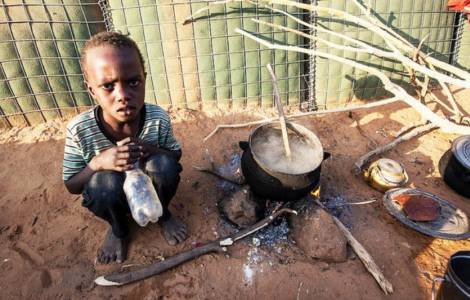
Nyala (Agenza Fides) - In the Otash refugee camp in the town of Nyala, southern Darfur, in the face of a food crisis that continues to worsen, children are also forced to look for food in the rubbish. The head of the refugee camp is already reporting cases of poisoning, with deaths affecting children and young people who were taken to hospital in critical condition after searching for food at the El Kosha landfill.
The food crisis is worsening across Sudan, leading to an increase in malnutrition, particularly among refugees, due to the lack of food.
In recent months there have been repeated reports of deaths as a result of famine, which is aggravating the already very precarious situation (see Fides, 10/10/2022). Those most at risk in these times of crisis are primarily the displaced. According to reports, since last spring, dozens of people who fled the military coup of October 25, 2021 have already starved to death in the Foro Baranga refugee camp in West Darfur (see Fides 25/10/2021). National and international humanitarian organizations face ongoing difficulties in accessing and distributing food and basic necessities in the refugee camp.
The now also head of the Otash camp reportedly called on the authorities to protect agricultural supplies, particularly by ensuring security for the displaced and their agricultural land in order to encourage the production of food for the displaced. The upcoming harvest could be promising, but there are also concerns that herdsmen will graze their cattle on the agricultural land and destroy crops.
In Darfur there are regular conflicts between shepherds and farmers. Since the rainy season ends in September and the herdsmen need fresh pasture, they let their cattle graze on unharvested arable land.
In the past, there have been controversial procedures for settling conflicts with compensation for lost crops. That all changed after the fall of former president and dictator Omar Al Bashir, who was ousted in a coup in 2019 after 30 years in power. The regime supported the region's pastoral Arab tribes while fighting non-Arab African peasants. Arab tribesmen were recruited by Al Bashir's regime to join the "Janjaweed" militia. Al Bashir used these Arab militias to quell an insurgency against ethnic exclusion in the region, which mainly targeted non-Arab African peasants. Many of these farmers still live in refugee camps. (AP) (Agenzia Fides, 17/10/2022)